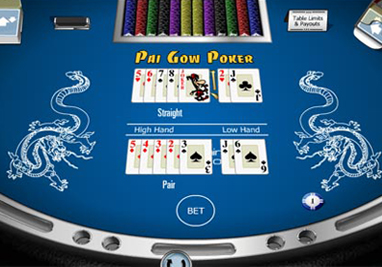
How to Play Pai Gow Poker
On the surface, Pai Gow Poker seems like an overly complex and slow to play game to be a big success in the casino. What you will find is surprising – there are more Pai Gow Poker tables than just about any other form of casino poker. The popularity of this game comes from the fact that it is involved (you’ll need to sort your cards into two hands) and it is social too. You will find that players often win or lose hands together, making for a great atmosphere in some games. This game is also low variance, with a lot of tied hands - this gives you a lot of play for your money.
This page takes you through the basic rules of Pai Gow Poker. You’ll find out how to get started in this entertaining game, understanding some of the interesting nuances of play as well as the general game-play.
Pai Gow Poker – Defining the Dealer
This game can be played with up to 7 players, and before the action starts the dealer hand must be defined. In a formal game, this is done with dice. 3 are rolled, and the croupier then counts clockwise to find the player who can be the ‘dealer position’ for that round. You can decline, in which case the next player gets the option.
Each person is then dealt 7 cards face-down from a deck of 53 cards. The additional card is a joker. This is wild, though only in certain ways. It can count as any card to make up a straight or a flush, and otherwise will count as an ace only.
Pai Gow Poker - High and Low Hands
Each player then divides their seven cards into a two card hand and a five card hand. The correct strategy for doing this is reasonably obvious, with the important rule that the 5-card hand must be of higher rank than the 2 card hand always in play. Those situations where you are not sure, you can ask for this to be done the ‘house way’, and the croupier will help you out. Online this can be done with a click of a button, and you will soon see the standard setup for dividing the hands.
The dealer will always divide the hands using the standard ‘house way’, so there is no room for individual opinions or influence from any cards accidentally seen with this. Once the dealer has completed their hand, the player’s hands are compared to the dealer and payouts are determined in the following way:
- Both player hands beat the dealer hands: Player Wins
- One player hand wins, the other loses: Tie (bet returned)
- Dealer wins one and the other is a tie: Dealer wins bet
- Dealer wins both hands: Dealer wins bet
As you can see, the dealer winning the ties is what creates the casino house edge in this game. I should also note that if you create a 2 card hand which is of higher rank than the 5-card and, this will be declared ‘Foul’ and could lose you your bet.
Side Bets in Pai Gow Poker Games
With the main game a little slower than many other casino poker games, and low variance (you can only win an amount equal to your bet), this game sometimes comes with a side bet to make it a little more interesting. The most popular Pai-Gow side bet is known as ‘Fortune’ and does come with some big payouts when you hit a monster hand – and an ‘envy’ bonus for other players at your table too.
This is based on the 7 cards you are dealt. It is completely separate from the main game against the dealer, and requires that you hit a 5 card poker hand out of your own seven cards ranked at a straight or above in order to get paid. The real attraction is the 5000-to-1 potential payout for a 7 card straight flush. Although the chances are slim of getting this, the minimum bet for the ‘Fortune’ wager is usually $5, which means you could see $25,000 coming your way if you were to hit.
Here are the other payouts for this side-bet:
- Straight: Pays 2-to-1
- 3 of a Kind: Pays 3-to-1
- Flush: Pays 4-to-1
- Full House: Pays 5-to-1
- Four of a Kind: Pays 20-to-1
- Straight Flush: Pays 50-to-1
- Royal Flush: Pays 100-to-1
- Five Aces (includes joker): Pays 250-to-1
- 7 Card Straight Flush (with joker): Pays 750-to-1
- Royal Flush + Royal Match: Pays 1000-to-1
- 7 Card Straight Flush (no joker): Pays 5000-to-1
Many gamblers will point out that side bets like this have a big house edge compared to the main game. On the other hand this does add some excitement to the game and if you can afford the money, it will make your Pai Gow Poker session that little bit more interesting.
